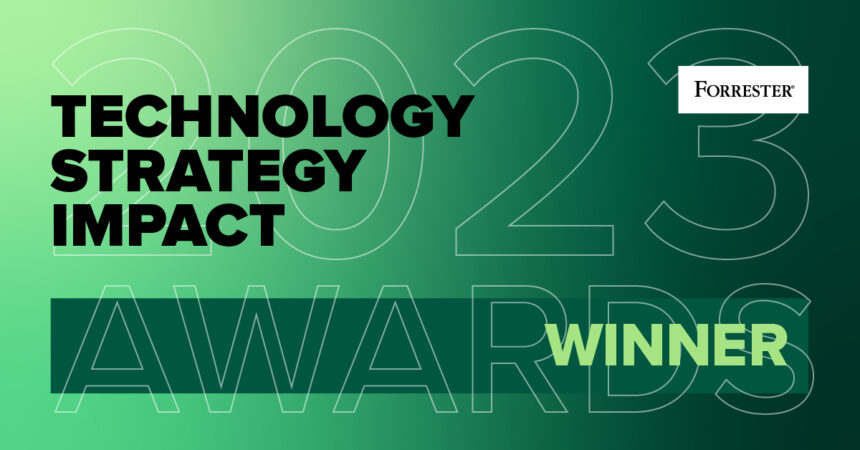When determining Forrester’s Technology Strategy Impact Award finalists, we seek to recognize excellence in technology strategy that drives an obsession with customer success and business growth. The companies recognized here are executing a future fit technology strategy that enables their company to quickly reconfigure business capabilities to meet future customer and employee demands with adaptivity, creativity, and resilience.
The finalists show a focus on customer and business outcomes and leverage a modern platform, practice, partner, and people strategy.
We congratulate Falabella, this year’s winner, and finalist Harvard Business School.
What’s next? Falabella will speak on stage about its technology strategy at Forrester’s Technology & Innovation North America, which will occur in Austin and digitally, September 10–12, 2023. We hope to see you there!
Falabella: Leading A Future Fit Technology Strategy In Latin America
Falabella, a pioneering physical-digital ecosystem in Latin America, has made waves in the retail and financial industry with its ambitious digital business transformation. Falabella serves more than 36 million customers, with business operations in seven countries (Chile, Peru, Colombia, Brazil, Mexico, Uruguay, and Argentina) and offices in China and India. The key to its success? A deeply ingrained belief in leveraging technology to simplify lives and deliver intuitive solutions. Falabella exemplifies the potential and power of a customer-centric, tech-led approach in the retail and financial industry. Falabella explained the key tenets of the future fit technology strategy that underpins this success:
- Flexible technology platforms that deliver customer and business value. Falabella begins with an innovative omnichannel experience driven by six key business platforms, all rooted in technology. These platforms — a marketplace, a rapid-growth digital wallet (Fpay), a banking division that is one of Chile’s top two banks, transformed omnichannel retail, a booming loyalty program, and an efficient home delivery system — let Falabella offer customers a seamless and integrated experience across all touchpoints. The company has embraced a microservices-based architecture, ensuring that technology solutions are flexible, scalable, and safe. A key manifestation of this tech-led approach is the marketplace platform (falabella.com), which partners with more than 18,000 sellers to offer a wide range of products across South America. Falabella’s commitment to growth and innovation shines through its digitalization efforts, such as in the banking division, which has climbed from fifth to second in number of accounts in Chile between 2019 and 2022. In the same period, Falabella’s credit and debit card sales have nearly doubled to $22 billion.
- Agile operating model driven by outcomes. Falabella also uses a business agility operating model, which organizes the whole company into portfolios around technology development and agile cells that are aligned by business platform objectives. This enables the organization to operate with customer-oriented metrics that guide designs and priorities in the cells. The modular technological approach lets cells operate independently, leveraging metrics at different levels for feedback and timely reactions. Taken as a whole, the strategy combines operational efficiency, innovation, and customer centricity in a dynamic digital landscape.
- Advanced analytics that empower teams. Falabella’s technology strategy uses advanced analytics, AI, and machine learning to deliver better outcomes. This approach fosters a culture of evidence-based decision-making: Teams can draw on customer, operational, and market data to make informed decisions that drive growth and customer success. Falabella’s technology platforms support the company’s business capabilities and deliver exceptional customer experiences.
- Focus on talent development and diversity. When each person at Falabella can reach his or her greatest potential, it authentically permeates to every customer, supplier, vendor, visitor, and ultimately to the people who make up the community. Falabella’s unique job portal, muevete.falabella.com, showcases the company’s commitment to attracting and retaining talent spread across LATAM and India. Falabella also has policies and benefits in place to promote inclusion and diversity. Falabella has two startup outreach programs: Falabella Link, which connects startups with the whole Falabella ecosystem to offer outside innovation to the company; and the Falabella Venture program, whose objective is to invest in startups that complement the Falabella ecosystem across the LATAM region.
Harvard Business School: Charting A Future Fit Technology Strategy In Global Education
Harvard Business School (HBS), with its mission of “educating leaders who make a difference in the world,” exemplifies how a pioneering educational institution can harness technology to revolutionize learning experiences and global impact. HBS’s ambitious future fit technology strategy aligns closely with its mission and lets HBS both adapt to the changing technological landscape and shape it, leveraging technology to deepen its positive global impact. Here’s a closer look at the transformative pillars of the strategy:
- Excel in service delivery. Rooted in customer engagement, HBS puts a premium on exceeding the needs of its diverse stakeholders — students, faculty, alumni, and staff. Its agility was particularly put to the test during the pandemic, when the school quickly innovated to develop hybrid classrooms to counter the disruption caused by the abrupt closure of campuses. As a result, HBS was the only institution among Harvard’s 12 schools to offer some traditional in-person learning in the fall of 2020. This transformative step not only maintained educational continuity but also opened new learning avenues, including reaching new communities in sub-Saharan Africa.
- Design a sustainable technology architecture. At the heart of HBS’s future fit strategy is the design of a sustainable technology architecture that enhances data accessibility and promotes insights-driven decision-making. HBS has focused on integrating data governance, data architecture, and cloud infrastructure into an enterprise architecture that supports research labs and various departments.
- Modernize foundational technology for digital transformation. Building on its sustainable architecture, HBS has begun to modernize many of the core systems vital to school operations. This includes the Student Information System and CRM, which is evolving from department-specific use cases to an HBS-wide platform that will help drive greater personalization and customer insights that take into consideration the myriad needs across all of HBS.
- Protect information and technology assets. Information security is a core focus for HBS and is woven into everything the school does. Over the past several years, HBS has focused on building a proactive information security program and community awareness strategies to stay ahead of threats.
- Build organizational health. Recognizing that people are as important as technology, HBS has implemented initiatives and programs to foster a culture of innovation, inclusion, and psychological safety. From developing tools and training for better talent management to adopting agile/scrum models for quicker response times, the institution is investing in its human resources. HBS has also created a diversity, equity, and inclusion task force and initiated “hackathon” events to spur creativity, resulting in numerous innovative solutions. Its efforts have been successful, as evidenced by improved leadership behavior scores, reduced help-desk ticket backlogs, and an inclusive environment that nurtures innovation.








